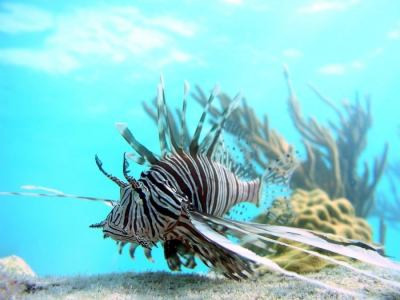Giant Lionfish Found At 300 Feet In Atlantic Ocean, Marks ‘New Frontier’ For Invasive Species [PHOTO]


An invasive fish species known for its voracious appetite has been discovered off the Florida coast at 300 feet below the water’s surface.
The predatory lionfish is native to the Indo-Pacific and has been found in greater number and size than previously on the seafloor near Fort Lauderdale, Fla. Using a deep-diving Antipodes submarine, researchers found the fish lurking in a Bill Boyd cargo ship, an artificial reef created in 1986, LiveScience reports.
"This was kind of an 'Ah hah!' moment," Stephanie Green, a researcher at Oregon State University, who participated in the dives, said in a statement. "It was immediately clear that this is a new frontier in the lionfish crisis, and that something is going to have to be done about it. Seeing it up-close really brought home the nature of the problem."
The lionfish, also known as Pterois, was accidentally introduced to the Atlantic Ocean in the 1990s, likely through the exotic pet trade. They soon became an unchallenged predator, where their populations have grown and been known to reduce native fish populations by up to 80 percent. Now widely established along the Southeast U.S. and Caribbean coasts, in some areas there are more than 1,000 lionfish per acre, the National Oceanic and Atmospheric Association said.
Results from the dive showed that the invasive lionfish are growing exceptionally large, up to 16 inches in size, compared to the average size of 12-15 inches long. This growth spurt means mature females can produce more offspring, researchers say.
The fish has no natural enemies in the Atlantic Ocean, but humans have tried to control the lionfish population. Trapping it for consumption works at shallower depths, yet researchers say that won’t be practical in deep waters.
"A lionfish will eat almost any fish smaller than it is," Green said. "Regarding the large fish we observed in the submersible dives, a real concern is that they could migrate to shallower depths as well and eat many of the fish there.”
Previous studies have observed how the lionfish manages to trap its prey. A single fish was found to reduce a native species’ population by 79 percent in five weeks. "It seems that the native fish don't perceive lionfish as fish," Mark Hixon, a marine biologist at Oregon State University said, pointing to the fish’s markings. "They swim right up to it," only to end up being swallowed whole.
© Copyright IBTimes 2024. All rights reserved.






















